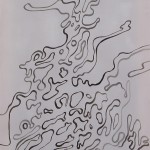soheila_desire_001
← Return to Pattern (dis)Placement
← Return to Pattern (dis)Placement
Bhook: Hunger Unveiled
solo exhibition by Sumaira Tazeen
curated by Soheila Esfahani
September 5-October 31, 2025
Berlin Tower Artspace
Kitchener, ON
Sumaira Tazeen invites us to her exhibition by offering cupcakes on display on a platter and as images in her paintings. Trained in the traditional South Asian art form of miniature paintings, Tazeen renders the cupcakes in gilded wrappers amongst hungry hyenas within a stark landscape. As the narrative in her work starts to emerge, the viewer must negotiate their way into the work. This act of negotiation opens cultural theorist Homi K. Bhabha’s the third space of enunciation; a site of dialogue which introduces different ways of thinking regarding the politics of marginalization, and where new narratives are adapted and hybridized.
By opening hybridity in her work, Tazeen’s work situates us in the space of in-betweenness where disparate elements come together: a traditional South Asian miniature painting depicting a seemingly Canadian landscape and a pop culture symbol of a cupcake being both prey and reward. This strategy predicates disjunction in the original narrative and allows the emergence of other positions that create a space for understanding social issues such as abuse, skewed power dynamics and trauma that emerge from Tazeen’s personal experience.
"Coated Howl", consisting of an arrangement of artificial cupcakes on an ornate platter, plays with the language of stereotypes in order to destabilize the subjectification that occurs through stereotypical discourse. These imitation cupcakes also operate as a form of translation, which in Bhabha’s terms is “a way of imitating, but in a mischievous, displacing sense—imitating an original in such a way that the priority of the original is not reinforced, but by the very fact that it can be simulated, copied, transferred, [and] transformed” (1990). Tazeen offers us a moment of contemplation on what these cupcakes metaphorically represent and questions how stereotypical narratives play out in the society.
Tazeen’s work highlights narratives related to social issues particularly redirected towards herself as a female artist in diaspora and allows the viewer to bring in their personal perspective and understanding of such issues to her work. Her playful use of cupcakes perhaps alludes to a cautionary tale similar to Grimm’s fairy tale of Hansel and Gretel but leaves us with a happy ending after all.
-curator: Soheila Esfahani
solo Exhibition
August 29-November 16, 2025
Richmond Hill Public Library Glass Case Gallery, Richmond Hill, ON
The Seeker & The Search is a response to the following verses by Rumi: I’m weary of beast and devil, a man is my desire. They said, “It is not to be found, we too have searched.” He answered, “What is not to be found is my desire.” Starting with the original Persian script in this body of work, the calligraphy moves towards abstraction, so that the language is obscured into rhythm with only fragments of words showing here and there. Text is extended even as it is deconstructed into mystery and texture. The hidden or background stands out as foreground, and the original lines of script move into spaces in-between which further emphasize the concept of unattainable; “not to be found”. These works are a record of Esfahani’s search; a map of her quest for “what cannot be found.”
DRAFTS 6: Mapping Diasporic Identities
Group exhibition: JJ Lee, Wen Li, Tazeen Qayyum, Faseeh Saleem, Paria Shahverdi, Sumaira Tazeen
curated by Soheila Esfahani
organized by Faseeh Saleem
October 3, 2025-February 28, 2026
Grebel Gallery at Centre for Peace Advancement
Conrad Grebel University College, University of Waterloo
Waterloo, ON


Leave a Reply
You must be logged in to post a comment.